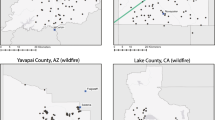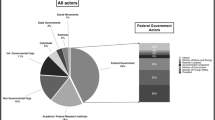Abstract
Extreme event attribution is an active area of scientific research, but public attribution of extreme events to climate change is not well understood – despite its importance to climate change communication and policy. We surveyed a representative sample of the U.S. population (n = 1071) to measure the public’s confidence in attributing five event types to climate change – wildfire, heat, rainfall/flooding, tornadoes, and hurricanes. Our respondents had the highest confidence in attributing wildfires and extreme heat to climate change, and the lowest confidence for hurricanes and tornadoes. Respondent characteristics, such as education level, age, race/ethnicity, political affiliation, and self-reported extreme event impacts, were linked to attribution confidence. Overall, those reporting negative impacts from extreme events had higher levels of attribution confidence. While Republicans on average had lower levels of attribution confidence, we found that self-reported negative event impacts had a moderating effect on attribution confidence among Republicans. Republicans who were more negatively impacted by extreme events had higher levels of attribution confidence compared to Republicans who were less impacted. We also compared the public’s attribution confidence to scientific assessments, developing a measure of attribution alignment. We found that respondents aligned with scientific event attribution for an average of 2 out of 5 extreme event types. While respondent characteristics were less consistently related to attribution alignment overall, Democrats on average had lower alignment. Our study suggests that the public is connecting climate change to extreme weather and making distinctions in attribution levels, but politics and experiences with extreme weather matter. We recommend that scientists and climate change communicators reflect this discernment in discourses about extreme events, climate change, and policy.





Similar content being viewed by others
Data availability
De-identified versions of the data will be made available upon request from the authors.
Code availability
Not applicable.
References
Abatzoglou JT, Williams AP (2016) Impact of anthropogenic climate change on wildfire across western US forests. PNAS 113:11770–11775. https://doi.org/10.1073/pnas.1607171113
Boudet H, Giordono L, Zanocco C, Satein H, Whitley H (2020) Event attribution and partisanship shape local discussion of climate change after extreme weather. Nat Clim Chang 10:69–76. https://doi.org/10.1038/s41558-019-0641-3
Brügger A, Demski C, Capstick S (2021) How personal experience affects perception of and decisions related to climate change: a psychological view. Weather Clim Soc 13:397–408. https://doi.org/10.1175/WCAS-D-20-0100.1
Capstick SB, Pidgeon NF (2014) Public perception of cold weather events as evidence for and against climate change. Clim Change 122:695–708. https://doi.org/10.1007/s10584-013-1003-1
Census Bureau US (2020) American Community Survey 2020 (5-year estimates). The United States Census Bureau. URL https://www.census.gov/data/developers/data-sets/acs-5year.2020.html (accessed 4.2.21)
Clarke B, Otto F, Stuart-Smith R, Harrington L (2022) Extreme weather impacts of climate change: an attribution perspective. Environ Res: Clim 1:012001. https://doi.org/10.1088/2752-5295/ac6e7d
Clarke B, Otto F, Jones R (2023) When don’t we need a new extreme event attribution study? Clim Change 176:60. https://doi.org/10.1007/s10584-023-03521-4
Cody EM, Stephens JC, Bagrow JP, Dodds PS, Danforth CM (2017) Transitions in climate and energy discourse between hurricanes Katrina and Sandy. J Environ Stud Sci 7:87–101. https://doi.org/10.1007/s13412-016-0391-8
Ettinger J, Walton P, Painter J, Osaka S, Otto FEL (2021) What’s up with the weather? public engagement with extreme event attribution in the United Kingdom. Weather Clim Soc 13:341–352. https://doi.org/10.1175/WCAS-D-20-0155.1
Flavelle C, Kanno-Youngs Z (2021) California, worsening fires show limits of Biden’s power. The New York Times
Funk C, Tyson A (2021) 67% of Americans perceive a rise in extreme weather, but partisans differ over government efforts to address it. Pew Research Center. URL https://www.pewresearch.org/fact-tank/2021/10/14/67-of-americans-perceive-a-rise-in-extreme-weather-but-partisans-differ-over-government-efforts-to-address-it/ (accessed 10.21.21)
Giordono L, Boudet H, Gard-Murray A (2020) Local adaptation policy responses to extreme weather events. Policy Sci 53:609–636. https://doi.org/10.1007/s11077-020-09401-3
Goldenberg S (2012) Sandy puts climate change back on the US election agenda. The Guardian
Hai Z, Perlman RL (2022) Extreme weather events and the politics of climate change attribution. Sci Adv 8:eabo2190. https://doi.org/10.1126/sciadv.abo2190
Holman EA, Thompson RR, Garfin DR, Silver RC (2020) The unfolding COVID-19 pandemic: a probability-based, nationally representative study of mental health in the United States. Sci Adv 6:eabd5390. https://doi.org/10.1126/sciadv.abd5390
Hopke JE (2020) Connecting extreme heat events to climate change: media coverage of heat waves and wildfires. Environ Communication 14:492–508. https://doi.org/10.1080/17524032.2019.1687537
Howe PD, Leiserowitz A (2013) Who remembers a hot summer or a cold winter? The asymmetric effect of beliefs about global warming on perceptions of local climate conditions in the U.S. Glob Environ Change 23:1488–1500. https://doi.org/10.1016/j.gloenvcha.2013.09.014
Howe PD, Marlon JR, Mildenberger M, Shield BS (2019) How will climate change shape climate opinion? Environ Res Lett 14:113001. https://doi.org/10.1088/1748-9326/ab466a
Jones MW, Abatzoglou JT, Veraverbeke S, Andela N, Lasslop G, Forkel M, Smith AJP, Burton C, Betts RA, van der Werf GR, Sitch S, Canadell JG, Santín C, Kolden C, Doerr SH, Le Quéré C (2022) Global and regional trends and drivers of fire under climate change. Rev Geophys 60 e2020RG000726. https://doi.org/10.1029/2020RG000726
Lahsen M, Ribot J (2022) Politics of attributing extreme events and disasters to climate change. WIREs Clim Change 13:e750. https://doi.org/10.1002/wcc.750
Leiserowitz A, Maibach E, Kotcher J, Carman J, Neyens L, Myers TA, Goldberg M, Campbell E, Lacroix K, Marlon J (2022) Climate change in the American mind, April 2022. Yale University and George Mason University
Leppert R (2022) Most Americans who have faced extreme weather see a link to climate change – Republicans included. Pew Research Center. URL https://www.pewresearch.org/fact-tank/2022/08/12/most-americans-who-have-faced-extreme-weather-see-a-link-to-climate-change-republicans-included/ (accessed 1.26.23)
Marlon JR, Wang X, Mildenberger M, Bergquist P, Swain S, Hayhoe K, Howe PD, Maibach E, Leiserowitz A (2021) Hot dry days increase perceived experience with global warming. Glob Environ Change 68:102247. https://doi.org/10.1016/j.gloenvcha.2021.102247
McClure J, Noy I, Kashima Y, Milfont TL (2022) Attributions for extreme weather events: science and the people. Clim Change 174:22. https://doi.org/10.1007/s10584-022-03443-7
McGinty EE, Presskreischer R, Han H, Barry CL (2020) Psychological distress and loneliness reported by US adults in 2018 and April 2020. JAMA 324:93–94. https://doi.org/10.1001/jama.2020.9740
McKenzie D, Littell JS (2017) Climate change and the eco-hydrology of fire: will area burned increase in a warming western USA? Ecol Appl 27:26–36. https://doi.org/10.1002/eap.1420
McKenzie D, Gedalof Z, Peterson DL, Mote P (2004) Climatic change, wildfire, and conservation. Conserv Biol 18:890–902
Muyskens J, Patel K, Ahmed N (2022) A week of highs: see where climate change made heat worse in America. Washington Post. URL https://www.washingtonpost.com/climate-environment/interactive/2022/maps-heat-wave-climate-change-us/ (accessed 6.19.23)
National Academies of Sciences, Engineering, and, Medicine (2016) Attribution of Extreme Weather events in the Context of Climate Change. The National Academies, Washington, DC
NORC (2021) Technical overview of the AmeriSpeak panel NORC’s probability-based household panel. NORC at the University of Chicago
Noviello A, Menghani S, Choudhri S, Lee I, Mohanraj B, Noviello A, Weather (2022) Guiding environmental messaging by quantifying the effect of extreme weather events on public discourse surrounding anthropogenic climate change. Clim Soc 15:17–30. https://doi.org/10.1175/WCAS-D-22-0053.1
Ogunbode CA, Demski C, Capstick SB, Sposato RG (2019) Attribution matters: revisiting the link between extreme weather experience and climate change mitigation responses. Glob Environ Change 54:31–39. https://doi.org/10.1016/j.gloenvcha.2018.11.005
Osaka S, Bellamy R (2020) Natural variability or climate change? Stakeholder and citizen perceptions of extreme event attribution. Glob Environ Change 62:102070. https://doi.org/10.1016/j.gloenvcha.2020.102070
Painter J, Ettinger J, Doutreix M-N, Strauß N, Wonneberger A, Walton P (2021) Is it climate change? Coverage by online news sites of the 2019 European summer heatwaves in France, Germany, the Netherlands, and the UK. Clim Change 169:4. https://doi.org/10.1007/s10584-021-03222-w
Pearce F (2022) It’s Not just climate: are we ignoring other causes of disasters?. Yale Environment 360. URL https://e360.yale.edu/features/its-not-just-climate-are-we-ignoring-other-causes-of-disasters (accessed 6.20.23)
Poushter J, Fagan M, Gubbala S (2022) Climate change remains top global threat across 19-country survey. Pew Research Center’s Global Attitudes Project. URL https://www.pewresearch.org/global/2022/08/31/climate-change-remains-top-global-threat-across-19-country-survey/ (accessed 1.27.23)
Raju E, Boyd E, Otto F (2022) Stop blaming the climate for disasters. Commun Earth Environ 3:1–2. https://doi.org/10.1038/s43247-021-00332-2
Roxburgh N, Guan D, Shin KJ, Rand W, Managi S, Lovelace R, Meng J (2019) Characterising climate change discourse on social media during extreme weather events. Glob Environ Change 54:50–60. https://doi.org/10.1016/j.gloenvcha.2018.11.004
Seneviratne SI, Zhang X, Adnan M, Badi W, Dereczynski C, Luca AD, Ghosh S, Iskandar I, Kossin J, Lewis S (2021) Weather and climate extreme events in a changing climate
Sengupta S (2023) Record pollution and heat herald a season of climate extremes. The New York Times
Shabecoff P (1988) Global warming has Begun, Expert tells Senate. The New York Times
Shepherd TG (2016) A common framework for approaches to extreme event attribution. Curr Clim Change Rep 2:28–38. https://doi.org/10.1007/s40641-016-0033-y
Smith H (2021) California hit by record-breaking fire destruction: Climate change is real, it’s bad. Los Angeles Times. URL https://www.latimes.com/california/story/2021-07-12/california-wildfires-outpacing-2020-worst-on-record (accessed 1.28.23)
Stern PC, Raimi KT (2015) Simple mental models for informing climate choices. Soc Res 82:581–606
Strauss BH, Orton PM, Bittermann K, Buchanan MK, Gilford DM, Kopp RE, Kulp S, Massey C, de Moel H, Vinogradov S (2021) Economic damages from Hurricane Sandy attributable to sea level rise caused by anthropogenic climate change. Nat Commun 12:2720. https://doi.org/10.1038/s41467-021-22838-1
Swain DL, Singh D, Touma D, Diffenbaugh NS (2020) Attributing extreme events to climate change: a new frontier in a warming world. One Earth 2:522–527. https://doi.org/10.1016/j.oneear.2020.05.011
Thaker J, Cook C (2021) Experience or attribution? Exploring the relationship between personal experience, political affiliation, and subjective attributions with mitigation behavioural intentions and COVID-19 recovery policy support. J Environ Psychol 77:101685. https://doi.org/10.1016/j.jenvp.2021.101685
Weber EU (2006) Experience-based and description-based perceptions of long-term risk: why global warming does not scare us (yet). Clim Change 77:103–120. https://doi.org/10.1007/s10584-006-9060-3
Weber EU (2016) What shapes perceptions of climate change? New research since 2010. WIREs Clim Change 7:125–134. https://doi.org/10.1002/wcc.377
Williams AP, Abatzoglou JT, Gershunov A, Guzman‐Morales J, Bishop DA, Balch JK, Lettenmaier DP (2019) Observed impacts of anthropogenic climate change on wildfire in California. Earth’s Futur 7(8):892–910. https://doi.org/10.1029/2019EF001210
Wong-Parodi G, Bruine de Bruin W (2017) Informing public perceptions about climate change: a ‘mental models’ approach. Sci Eng Ethics 23:1369–1386. https://doi.org/10.1007/s11948-016-9816-8
Zanocco C, Boudet H, Nilson R, Satein H, Whitley H, Flora J (2018) Place, proximity, and perceived harm: extreme weather events and views about climate change. Clim Change 149:349–365. https://doi.org/10.1007/s10584-018-2251-x
Zanocco C, Boudet H, Nilson R, Flora J (2019) Personal harm and support for climate change mitigation policies: evidence from 10 U.S. communities impacted by extreme weather. Glob Environ Change 59:101984. https://doi.org/10.1016/j.gloenvcha.2019.101984
Zanocco C, Flora J, Boudet H (2022) Disparities in self-reported extreme weather impacts by race, ethnicity, and income in the United States. PLOS Clim 1:e0000026. https://doi.org/10.1371/journal.pclm.0000026
Acknowledgements
The authors would like to thank our survey respondents and NORC at the University of Chicago for allowing us to include survey questions on their AmeriSpeak Omnibus panel. The authors would also like to thank Deepti Singh for her useful input about this research.
Funding
Support for this research was provided by the National Science Foundation’s Smart & Connected Communities Program (#1737565).
Author information
Authors and Affiliations
Contributions
Conceptualization: Chad Zanocco, Philip Mote, June Flora, Hilary Boudet; Formal analysis and investigation: Chad Zanocco; Writing – original draft preparation: Chad Zanocco, Philip Mote, June Flora, Hilary Boudet; Writing – review and editing: Chad Zanocco, Philip Mote, June Flora, Hilary Boudet; Funding acquisition: Hilary Boudet.
Corresponding author
Ethics declarations
Ethics approval
This study was reviewed by the Oregon State University Human Research Protection Program (IRB-2019-0137) and received an exempt determination.
Conflicts of interest
The authors declare no competing interests or conflicts of interest.
Additional information
Publisher’s Note
Springer Nature remains neutral with regard to jurisdictional claims in published maps and institutional affiliations.
Electronic supplementary material
Below is the link to the electronic supplementary material.
Rights and permissions
Springer Nature or its licensor (e.g. a society or other partner) holds exclusive rights to this article under a publishing agreement with the author(s) or other rightsholder(s); author self-archiving of the accepted manuscript version of this article is solely governed by the terms of such publishing agreement and applicable law.
About this article
Cite this article
Zanocco, C., Mote, P., Flora, J. et al. Comparing public and scientific extreme event attribution to climate change. Climatic Change 177, 76 (2024). https://doi.org/10.1007/s10584-024-03735-0
Received:
Accepted:
Published:
DOI: https://doi.org/10.1007/s10584-024-03735-0




